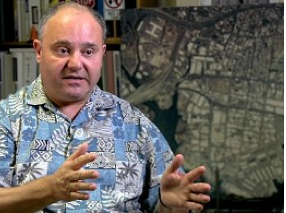Washington Post: Use of Public Transit Isn’t Surging
BY PANOS PREVEDOUROS PHD -Three professors from Columbia, Cornell and Rutgers take the deceitful data of the American Public Transit Association to task and while at it, they also reveal the expensive nothingness that public transit is in the U.S., excluding a few mega-cities.
APTA
Transit users took 10.65 billion trips in 2013, topping the previous record of 10.59 billion trips in 2008.There is a fundamental change in American travel behavior: a nation moving away from driving and toward more efficient and sustainable public transit.
3 Professors
APTA’s numbers are deceptive, and this interpretation is wrong. Transit is a small and stagnant part of the transportation system.Transit receives about 20% of U.S. surface transportation funding but accounts for 2% to 3 % of all U.S. passenger trips. In fact, use of mass transportation has remained remarkably steady, and low, since about 1970. There is nothing exceptional about 2013 numbers; they represent a depressing norm.
New York alone accounts for a third of all transit travel. Transit use outside New York declined in absolute terms last year. No one should pretend [that congestion and pollution] problems are spontaneously solving themselves because Americans have decided en masse to ride transit instead of driving.
Building transit systems is not the same as having people ride them, and people riding transit more is not the same as people driving less (plenty of transit riders are people who used to walk). Additionally, transit is not the only viable alternative to using a car. The environment is helped when drivers switch to buses but also when drivers switch to bikes.
What is Honolulu Rail Really About?
During the proceedings at the 9th Circuit Court in HonoluluTraffic.com v. Federal Transit Administration, the City's lawyer asserted that the purpose of the rail is to "reduce reliance on the private automobile," "promote smart growth land use policies," and "provide an equitable alternative for low-income populations and transit-dependent communities."The quick summary of these purposes is that Honolulu rail is about land development, and land and transportation controls for “sustainability.” Yes but what does this really mean? It means that the core outcome of the promotion of rail is the promotion of poverty:
(1) "Reduce reliance on the private automobile" –people will continue to be dependent on cars but they will have to also pay for a much larger transit system.
(2) "Promote smart growth land use policies" –all of these policies will lead to high rents and far more expensive land parcels. While lenders and developers will prosper (often with tax credits and breaks), the people will suffer from higher prices and taxes.
(3) "Provide an equitable alternative…” –social science research indicates that the provision of private transportation is the quickest tool out of unemployment because a person can reach many more places to find a job compared to public transportation. Transit goes to fewer places; lower mobility means more unemployment and underemployment.
(4) Entirely absent is the purpose of reducing traffic congestion. Rail won’t reduce congestion. Traffic congestion in 2020 with rail will be far worse than it is now: Worse congestion, lower mobility, worse quality of life, and worse off economy.
Also entirely absent is the public’s ability to pay for the rail vis-a-vis mounting local liabilities for infrastructure and social programs. San Juan, PR is leading the way (currently in economic collapse) and Honolulu is following in the same path.
HECO Solar?
Poncho Solar, Haleakala Solar, Kumu Kit Solar and now HECO Solar?HECO proposed for example a large PV deployment on pristine land next to the power plant at Kahe point.
I have a slogan for HECO’s solar farm proposals: “We get the savings, you get the bills.”
The PUC must not approve any of these proposals.
Instead the PUC should direct the power monopoly to expedite private property rooftop PV deployment.
Also see The Public and Private Versions of Solar Power and Hawaii Energy Policy Has Driven up Electric Bills as HECO Maintains Profits.

No comments:
Post a Comment